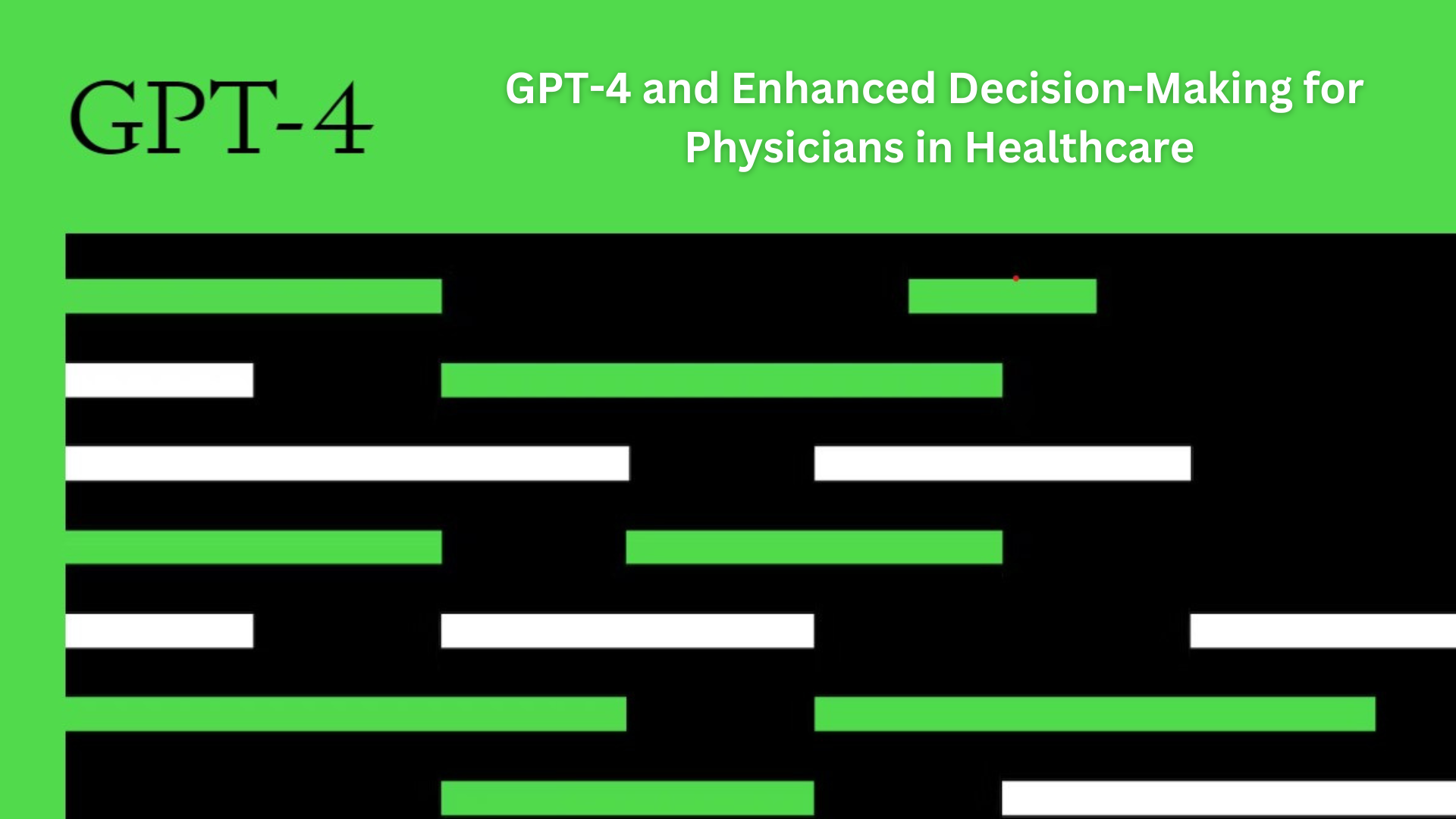GPT-4 and Enhanced Decision-Making for Physicians in Healthcare

Authors: Amina Khalpey, PhD, Brynne Rozell, BS, Zain Khalpey, MD,PhD, FACS
The advent of an artificial intelligence technology called GPT-4, the newest iteration of OpenAI’s generative pre-trained transformer, promises to revolutionize decision-making in the healthcare industry. By providing physicians with sophisticated natural language processing and artificial intelligence capabilities, GPT-4 has the potential to greatly improve patient care and outcomes. In this essay, we will discuss the ways in which GPT-4 can enhance the decision-making process for physicians, including assisting in diagnostics, treatment planning, and continuous medical education. We will also address potential limitations and ethical considerations associated with this technology.
GPT-4 Enhanced Healthcare:
Since the inception of artificial intelligence (AI), the healthcare industry has been one of the primary beneficiaries of advancements in this field (1). The latest creation of OpenAI, called GPT-4 (Generative Pre-trained Transformer 4) is a large, unsupervised language model. It uses a deep learning technique called Transformer, which is based on the self-attention mechanism. GPT-4 is trained on a dataset of 45TB of text, making it the largest language model ever released. It can generate human-like text and is being used to create applications such as question-answering, summarization, and machine translation. The GPT-4 model has emerged as a powerful tool especially for medical professionals, offering assistance in several key areas of decision-making, from diagnostics to treatment planning. This post explores the transformative potential of GPT-4 in revolutionizing the decision-making capabilities of physicians in healthcare.
Diagnostics Support:
GPT-4 has demonstrated remarkable accuracy in diagnosing diseases and conditions (2). By analyzing individual patient data such as symptoms, medical history, and laboratory results, GPT-4 can rapidly generate differential diagnoses, helping physicians to make better-informed decisions. In particular, GPT-4’s proficiency in natural language processing allows it to sift through large volumes of medical literature and identify relevant information to support diagnostic conclusions (3). While nothing can replace a physician’s nuanced decision making, this latest technological advancement will enable doctors to more efficiently make critical diagnostic decisions based on the latest research.
Treatment Planning:
The complexity of medical decision-making requires the consideration and amalgamation of multiple factors, such as patient preferences, comorbidities, and potential treatment side effects. GPT-4 can streamline this strategizing process by analyzing patient information and suggesting evidence-based treatment plans (4). Additionally, GPT-4 can provide physicians with up-to-date information about potential drug interactions and side effects, enabling them to make safer and more effective treatment decisions. By combining inhuman processing speeds, the latest research, and medical records all at the touch of a button, GPT-4 is set to become an invaluable planning tool for doctors.
Continuous Medical Education:
Physicians need to constantly stay abreast of the latest medical research and recommendations to provide optimal patient care. GPT-4 can help to facilitate this continuous medical education by accurately summarizing new research findings, presenting case studies, and suggesting relevant literature (5). Not only will physicians be up to date on cutting edge research, but they will be accomplishing this in less time than ever before. GPT-4 is an incredible asset that facilitates tailored educational materials, enabling physicians to remain up-to-date in their profession and improve their judgment-forming skills while conserving valuable time.
To learn more about the development of a “Pocket Ai Doctor” tool read our post here
Limitations and Ethical Considerations:
Despite the many potential benefits of GPT-4, there are limitations and ethical concerns to consider. The model’s performance is contingent on the quality and breadth of data it has been trained on, which may lead to biases or inaccuracies (6). Furthermore, the reliance on AI in medical decision-making may result in over-reliance and a loss of human judgment in critical situations. Ensuring the appropriate use of GPT-4, along with proper oversight, will be essential in addressing these challenges.
Conclusion:
The GPT-4 model has the potential to revolutionize decision-making for physicians in healthcare. By supporting physicians throughout diagnostics, treatment planning, and continuous medical education, GPT-4 can improve patient outcomes and overall healthcare quality. However, as with the implementation of any new technology, it is essential to address the limitations and ethical concerns associated with this field to ensure its responsible and effective use in the medical field.
Bibliography:
Jiang, F., Jiang, Y., Zhi, H., Dong, Y., Li, H., Ma, S., … & Wang, Y. (2017). Artificial intelligence in healthcare: past, present and future. Stroke and Vascular Neurology, 2(4), 230-243.
Wang, P., Berzin, T. M., Glissen Brown, J. R., Bharadwaj, S., Becq, A., Xiao, X., … & Liu, P. (2020). Real-time automatic detection of colorectal polyps with artificial intelligence during colonoscopy: a multicenter, randomized, controlled study. The Lancet Gastroenterology & Hepatology, 5(9), 672-681.
Choi, E., Bahadori, M. T., Schuetz, A., Stewart, W. F., & Sun, J. (2016). Doctor AI: predicting clinical events via recurrent neural networks. Journal of Machine Learning Research, 56, 3010-3018.
Weng, S. F., Reps, J., Kai, J., Garibaldi, J. M., & Qureshi, N. (2017). Can machine-learning improve cardiovascular risk prediction using routine clinical data? PloS one, 12(4), e0174944.
Krittanawong, C., Zhang, H., Wang, Z., Aydar, M., & Kitai, T. (2017). Artificial intelligence in precision cardiovascular medicine. Journal of the American College of Cardiology, 69(21), 2657-2664.
Gianfrancesco, M. A., Tamang, S., Yazdany, J., & Schmajuk, G. (2018). Potential biases in machine learning algorithms using electronic health record data. JAMA Internal Medicine, 178(11), 1544-1547.



